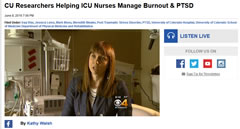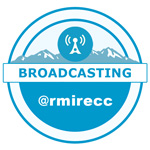Attention A T users. To access the menus on this page please perform the following steps.
1. Please switch auto forms mode to off.
2. Hit enter to expand a main menu option (Health, Benefits, etc).
3. To enter and activate the submenu links, hit the down arrow.
You will now be able to tab or arrow up or down through the submenu options to access/activate the submenu links.
Locator
Contact
Search
VA »
Health Care »
MIRECC / CoE
» Rocky Mountain MIRECC »
Rocky Mountain MIRECC - Meredith Mealer PhD
MIRECC / CoE
Rocky Mountain MIRECC - Meredith Mealer PhD

Updated: 20 July 2018
Biography
 Meredith Mealer PhD
Meredith Mealer PhD- Title: Director, Colorado Multiple Institutional Review Board (COMIRB)
Assistant Professor of Medicine
Contact:
720-723-4864
Meredith.Mealer@ucdenver.edu - Meredith Mealer PhD is a registered nurse and an Assistant Professor of Physical Medicine and Rehabilitation (PM&R) at the University of Colorado, Anschutz School of Medicine and the Director of the Colorado Multiple Institutional Review Board (COMIRB). Her primary area of research interest is resilience training in healthcare professionals as a mechanism to mitigate psychological distress that results from the work environment. With her expertise in research regulations and the conduct of clinical trials, she is also interested in research to enhance the efficiency of conducting clinical trials on a systems level.
Recent Publications
- Mealer M, Conrad D, Evans J, Jooste K, Solyntjes J, Rothbaum B, Moss M. Feasibility and acceptability of a resilience training program for intensive care unit nurses. Am J Crit Care. 2014 Nov;23(6):e97-105. doi: 10.4037/ajcc2014747.
- BACKGROUND: The critical nursing shortage is particularly apparent in specialty areas such as intensive care units (ICUs). Some nurses develop resilient coping strategies and adapt to stressful work experiences, mitigating the development of common maladaptive psychological symptoms. OBJECTIVES: To determine if a multimodal resilience training program for ICU nurses was feasible to perform and acceptable to the study participants. METHODS: In a randomized and controlled 12-week intervention study, treatment and control groups completed demographic questions and measures of resilience, anxiety, depression, posttraumatic stress disorder (PTSD), and burnout syndrome before and after the intervention. The intervention included a 2-day educational workshop, written exposure sessions, event-triggered counseling sessions, mindfulness-based stress reduction exercises, and a protocolized aerobic exercise regimen. Nurses in the intervention arm also completed satisfaction surveys for each component of the intervention. RESULTS: This mulitmodal resilience training program was feasible to conduct and acceptable to ICU nurses. Both nurses randomized to the treatment group and nurses randomized to the control group showed a significant decrease in PTSD symptom score after the intervention. CONCLUSIONS: A multifaceted resilience training program for ICU nurses was both feasible and acceptable. A sufficiently powered, randomized clinical trial is needed to assess the effect of the intervention on improving individuals' level of resilience and improving psychological outcomes such as symptoms of anxiety, depression, burnout syndrome, and PTSD. ©2014 American Association of Critical-Care Nurses.
- Mealer M, Jones Rn J. Methodological and ethical issues related to qualitative telephone interviews on sensitive topics. Nurse Res. 2014 Mar;21(4):32-7. doi: 10.7748/nr2014.03.21.4.32.e1229.
- AIM: To explore the methodological and ethical issues of conducting qualitative telephone interviews about personal or professional trauma with critical care nurses. BACKGROUND: The most common method for conducting interviews is face-to-face. However, there is evidence to support telephone interviewing on a variety of sensitive topics including post-traumatic stress disorder (PTSD). Qualitative telephone interviews can limit emotional distress because of the comfort experienced through virtual communication. Critical care nurses are at increased risk of developing PTSD due to the cumulative exposure to work-related stress in the intensive care unit. We explored the methodological and ethical issues of conducting qualitative telephone interviews, drawing on our experiences communicating with a group of critical care nurses. DATA SOURCES: Qualitative research interviews with 27 critical care nurses. Fourteen of the nurses met the diagnostic criteria for PTSD; 13 did not and had scores consistent with high levels of resilience. REVIEW METHODS: This is a methodology paper on the authors' experiences of interviewing critical care nurses on sensitive topics via the telephone. DISCUSSION: The authors found that establishing rapport and connections with the participants and the therapeutic use of non-verbal communication were essential, and fostered trust and compassion. The ethical issues of this mode of communication include protecting the privacy and confidentiality associated with the disclosure of sensitive information, and minimising the risk of psychological harm to the researcher and participants. CONCLUSION: Qualitative telephone interviews are a valuable method of collecting information on sensitive topics. IMPLICATIONS FOR RESEARCH/PRACTICE: This paper explores a method of interviewing in the workplace. It will help inform interventions to promote healthy adaptation following trauma exposure in the intensive care unit.
- Return to Top
- Mealer M, Kittelson J, Thompson BT, Wheeler AP, Magee JC, Sokol RJ, Moss M, Kahn MG. Remote source document verification in two national clinical trials networks: a pilot study. PLoS One. 2013 Dec 5;8(12):e81890. doi: 10.1371/journal.pone.0081890.
 OBJECTIVE: Barriers to executing large-scale randomized controlled trials include costs, complexity, and regulatory requirements. We hypothesized that source document verification (SDV) via remote electronic monitoring is feasible. METHODS: Five hospitals from two NIH sponsored networks provided remote electronic access to study monitors. We evaluated pre-visit remote SDV compared to traditional on-site SDV using a randomized convenience sample of all study subjects due for a monitoring visit. The number of data values verified and the time to perform remote and on-site SDV was collected. RESULTS: Thirty-two study subjects were randomized to either remote SDV (N=16) or traditional on-site SDV (N=16). Technical capabilities, remote access policies and regulatory requirements varied widely across sites. In the adult network, only 14 of 2965 data values (0.47%) could not be located remotely. In the traditional on-site SDV arm, 3 of 2608 data values (0.12%) required coordinator help. In the pediatric network, all 198 data values in the remote SDV arm and all 183 data values in the on-site SDV arm were located. Although not statistically significant there was a consistent trend for more time consumed per data value (minutes +/- SD): Adult 0.50 +/- 0.17 min vs. 0.39 +/- 0.10 min (two-tailed t-test p=0.11); Pediatric 0.99 +/- 1.07 min vs. 0.56 +/- 0.61 min (p=0.37) and time per case report form: Adult: 4.60 +/- 1.42 min vs. 3.60 +/- 0.96 min (p=0.10); Pediatric: 11.64 +/- 7.54 min vs. 6.07 +/- 3.18 min (p=0.10) using remote SDV. CONCLUSIONS: Because each site had different policies, requirements, and technologies, a common approach to assimilating monitors into the access management system could not be implemented. Despite substantial technology differences, more than 99% of data values were successfully monitored remotely. This pilot study demonstrates the feasibility of remote monitoring and the need to develop consistent access policies for remote study monitoring. Free PMC Article
OBJECTIVE: Barriers to executing large-scale randomized controlled trials include costs, complexity, and regulatory requirements. We hypothesized that source document verification (SDV) via remote electronic monitoring is feasible. METHODS: Five hospitals from two NIH sponsored networks provided remote electronic access to study monitors. We evaluated pre-visit remote SDV compared to traditional on-site SDV using a randomized convenience sample of all study subjects due for a monitoring visit. The number of data values verified and the time to perform remote and on-site SDV was collected. RESULTS: Thirty-two study subjects were randomized to either remote SDV (N=16) or traditional on-site SDV (N=16). Technical capabilities, remote access policies and regulatory requirements varied widely across sites. In the adult network, only 14 of 2965 data values (0.47%) could not be located remotely. In the traditional on-site SDV arm, 3 of 2608 data values (0.12%) required coordinator help. In the pediatric network, all 198 data values in the remote SDV arm and all 183 data values in the on-site SDV arm were located. Although not statistically significant there was a consistent trend for more time consumed per data value (minutes +/- SD): Adult 0.50 +/- 0.17 min vs. 0.39 +/- 0.10 min (two-tailed t-test p=0.11); Pediatric 0.99 +/- 1.07 min vs. 0.56 +/- 0.61 min (p=0.37) and time per case report form: Adult: 4.60 +/- 1.42 min vs. 3.60 +/- 0.96 min (p=0.10); Pediatric: 11.64 +/- 7.54 min vs. 6.07 +/- 3.18 min (p=0.10) using remote SDV. CONCLUSIONS: Because each site had different policies, requirements, and technologies, a common approach to assimilating monitors into the access management system could not be implemented. Despite substantial technology differences, more than 99% of data values were successfully monitored remotely. This pilot study demonstrates the feasibility of remote monitoring and the need to develop consistent access policies for remote study monitoring. Free PMC Article- Return to Top
- Mealer M, Jones J. Posttraumatic stress disorder in the nursing population: a concept analysis. Nurs Forum. 2013 Oct-Dec;48(4):279-88. doi: 10.1111/nuf.12045.
- PURPOSE: This article is a report of an analysis of the concept of posttraumatic stress disorder (PTSD) and its application to the nursing population. BACKGROUND: Nurses are at an increased risk for work-related stress resulting in retention issues and impaired functioning in work and home environment. The nursing discipline has been inconsistent with the concepts used to describe the distress and resultant discussions related to the comprehensive nature of the distress experienced, heavily focusing on existing medical language that emphasizes disorders and psychopathology. REVIEW METHODS: Walker and Avant's strategy for concept analysis was used in this analysis. A literature review for 1994-2011 was conducted for the following keywords: secondary traumatic stress, compassion fatigue, vicarious traumatization, posttraumatic stress disorder, and nurse. RESULTS: The concept of posttraumatic stress disorder in the nursing population is best described within the context of the Nurse as Wounded Healer theory. Essential attributes include intrusions, avoidance, and hyperarousal. The consequences include worldview changes, retention issues, sleep disruption, and social network disturbances. CONCLUSION: This concept analysis viewed through The Nurse as Wounded Healer lens, offers clarity to the concept of PTSD within the nursing population and identifies limitations to prior conceptualizations. © 2013 Wiley Periodicals, Inc.
- PubMed Keywords: Concept analysis; critical care; nursing model; psychiatric/mental health
- Return to Top
- Czaja AS, Moss M, Mealer M. Symptoms of posttraumatic stress disorder among pediatric acute care nurses. J Pediatr Nurs. 2012 Aug;27(4):357-65. doi: 10.1016/j.pedn.2011.04.024.
- In their work, pediatric acute care nurses may encounter traumatic events and be at risk for posttraumatic stress disorder (PTSD). This survey-based study examines the potential diagnosis of PTSD among nurses at a tertiary children's hospital with a Level 1 trauma center. Twenty-one percent of respondents had strong PTSD symptoms without significant difference between units. Nurses with potential PTSD had more comorbid symptoms of anxiety, depression, and burnout and were more often considering a career change. Furthermore, symptoms affected not only their work but also their personal lives. Future research should focus upon identifying pediatric nurses with PTSD to provide therapeutic interventions and reducing high-risk events and their potential impact. Copyright © 2012 Elsevier Inc. All rights reserved. Free PMC Article
- Return to Top
- Mealer M, Jones J, Moss M. A qualitative study of resilience and posttraumatic stress disorder in United States ICU nurses. Intensive Care Med. 2012 Sep;38(9):1445-51. doi: 10.1007/s00134-012-2600-6.
- PURPOSE: Intensive care unit (ICU) nurses are at increased risk of developing psychological problems including posttraumatic stress disorder (PTSD). However, there are resilient individuals who thrive and remain employed as ICU nurses for many years. The purpose of this study was to identify mechanisms employed by highly resilient ICU nurses to develop preventative therapies to obviate the development of PTSD in ICU nurses. METHODS: Qualitative study using semi-structured telephone interviews with randomly selected ICU nurses in the USA. Purposive sampling was used to identify ICU nurses who were highly resilient, based on the Connor-Davidson Resilience Scale and those with a diagnosis of PTSD, based on the posttraumatic diagnostic scale. New interviews were conducted until we reached thematic saturation. RESULTS: Thirteen highly resilient nurses and fourteen nurses with PTSD were interviewed (n = 27). A constructivist epistemological framework was used for data analysis. Differences were identified in four major domains: worldview, social network, cognitive flexibility, and self-care/balance. Highly resilient nurses identified spirituality, a supportive social network, optimism, and having a resilient role model as characteristics used to cope with stress in their work environment. ICU nurses with a diagnosis of PTSD possessed several unhealthy characteristics including a poor social network, lack of identification with a role model, disruptive thoughts, regret, and lost optimism. CONCLUSION: Highly resilient ICU nurses utilize positive coping skills and psychological characteristics that allow them to continue working in the stressful ICU environment. These characteristics and skills may be used to develop target therapies to prevent PTSD in ICU nurses.
- Return to Top
- Mealer M, Jones J, Newman J, McFann KK, Rothbaum B, Moss M. The presence of resilience is associated with a healthier psychological profile in intensive care unit (ICU) nurses: results of a national survey. Int J Nurs Stud. 2012 Mar;49(3):292-9. doi: 10.1016/j.ijnurstu.2011.09.015.
- OBJECTIVE: ICU nurses are repeatedly exposed to work related stresses resulting in the development of psychological disorders including posttraumatic stress disorder and burnout syndrome. Resilience is a learnable multidimensional characteristic enabling one to thrive in the face of adversity. In a national survey, we sought to determine whether resilience was associated with healthier psychological profiles in intensive care unit nurses. DESIGN: Surveys were mailed to 3500 randomly selected ICU nurses across the United States and included: demographic questions, the Posttraumatic Diagnostic Scale, Hospital Anxiety and Depression Scale, Maslach Burnout Inventory and the Connor-Davidson Resilience Scale. MEASUREMENTS AND MAIN RESULTS: Overall, 1239 of the mailed surveys were returned for a response rate of 35%, and complete data was available on a total of 744 nurses. Twenty-two percent of the intensive care unit nurses were categorized as being highly resilient. The presence of high resilience in these nurses was significantly associated with a lower prevalence of posttraumatic stress disorder, symptoms of anxiety or depression, and burnout syndrome (<0.001 for all comparisons). In independent multivariable analyses adjusting for five potential confounding variables, the presence of resilience was independently associated with a lower prevalence of posttraumatic stress disorder (p<0.001), and a lower prevalence of burnout syndrome (p<0.001). CONCLUSIONS: The presence of psychological resilience was independently associated with a lower prevalence of posttraumatic stress disorder and burnout syndrome in intensive care unit nurses. Future research is needed to better understand coping mechanisms employed by highly resilient nurses and how they maintain a healthier psychological profile. Copyright © 2011 Elsevier Ltd. All rights reserved. Free PMC Article
- Return to Top
- Mealer M, Burnham EL, Goode CJ, Rothbaum B, Moss M. The prevalence and impact of post traumatic stress disorder and burnout syndrome in nurses. Depress Anxiety. 2009;26(12):1118-26. doi: 10.1002/da.20631.
- OBJECTIVE: To determine whether post traumatic stress disorder (PTSD) and burnout syndrome (BOS) are common in nurses, and whether the co-existence of PTSD and BOS is associated with altered perceptions of work and nonwork-related activities. METHODS: University hospital nurses were administered four validated psychological questionnaires. RESULTS: The response rate was 41% (332/810). Twenty two percent (73/332) had symptoms of PTSD, 18% (61/332) met diagnostic criteria for PTSD, and 86% (277/323) met criteria for BOS. Ninety eight percent (59/60) of those fulfilling diagnostic criteria for PTSD were positive for BOS. When grouped into three categories: positive for PTSD and BOS (n=59), positive for BOS and negative for PTSD (n=217), and negative for both BOS and PTSD (n=46), there were significant differences in the years of employment as a nurse (P<.0001), perceptions of collaborative nursing care (P=.006), confidence in physicians (P=.01), and perception that their work impacted patient outcomes (P=.01). Nurses with BOS and PTSD were significantly more likely to have difficulty in their life outside of the work environment when compared to those with BOS alone. CONCLUSIONS: We identified that PTSD and BOS are common in nurses and those with PTSD will almost uniformly have symptoms of BOS. Co-existence of PTSD and BOS has a dramatic effect on work and nonwork related activities and perceptions. Free PMC Article
- Return to Top
- Mealer ML, Shelton A, Berg B, Rothbaum B, Moss M. Increased prevalence of post-traumatic stress disorder symptoms in critical care nurses. Am J Respir Crit Care Med. 2007 Apr 1;175(7):693-7.
- RATIONALE: Intensive care unit (ICU) nurses work in a demanding environment where they are repetitively exposed to traumatic situations and stressful events. The psychological effects on nurses as a result of working in the ICU are relatively unknown. OBJECTIVE: To determine whether there is an increased prevalence of psychological symptoms in ICU nurses when compared with general nurses. METHODS: We surveyed ICU and general nurses from three different hospitals (n=351) and then surveyed ICU nurses throughout the metropolitan area (n=140). MEASUREMENTS AND MAIN RESULTS: In both cohorts of nurses, we determined the prevalence of symptoms of post-traumatic stress disorder (PTSD), anxiety, and depression using validated survey instruments. Within our hospital system, 24% (54/230) of the ICU nurses tested positive for symptoms of PTSD related to their work environment, compared with 14% (17/121) of the general nurses (p=0.03). ICU nurses did not report a greater amount of stress in their life outside of the hospital than general nurses. There was no difference in symptoms of depression or anxiety between ICU and general nurses. In the second survey of ICU nurses from our metropolitan area, 29% (41/140) of the respondents reported symptoms of PTSD, similar to our first cohort of ICU nurses. CONCLUSIONS: ICU nurses have an increased prevalence of PTSD symptoms when compared with other general nurses. These results may increase awareness of these symptoms in nurses and lead to future interventions that improve their mental health and job satisfaction and help retain ICU nurses in their profession.
Media
Rocky Mountain Short Takes on Suicide Prevention: PTSD and the ICU Nurse: Bolstering Resiliency in the Helping Professions
5 October 2016
Adam interviews a new addition to the Rocky Mountain MIRECC for Suicide Prevention team, Dr. Meredith Mealer. Meredith as done important work studying the high prevalence of PTSD in ICU nurses. Her work has found that ICU nurses suffer from PTSD at a rate comparable to soldiers returning from Iraq and Afghanistan. Dr. Mealer's research has also provided steps that nurses and ALL helping professionals can take that have proven to bolster resilience. The work is important for all in the helping field.
Supporting material:
- Learn more about Dr. Meredith Mealer
- Watch Meredith's Denver Channel 4 News video: CU researchers take aim at PTSD, burnout in the ICU
- Podcast transcript
- Feasibility and acceptability of a resilience training program for intensive care unit nurses
- A qualitative study of resilience and posttraumatic stress disorder in United States ICU nurses
- The prevalence and impact of post traumatic stress disorder and burnout syndrome in nurses
- The presence of resilience is associated with a healthier psychological profile in intensive care unit (ICU) nurses: results of a national survey
The podcast is approximately 21 minutes long.
You can subscribe to the RM Short Takes Podcast on iTunes, Google Play or your favorite podcasts tool.
Categories: Suicide Prevention
Grants/Funding
- Dr. Mealer’s recent grant funded projects include:
- Feasibility and Acceptability of a Resilience Training Program for Intensive Care Unit Nurses (K24HL089223)
- Remote Source Document Verification in Two National Clinical Trials Networks: A Feasibility Study (UL1RR025780)



























